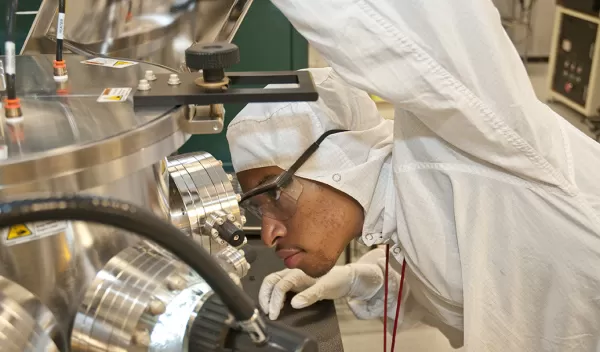
NSF renews investment in National Nanotechnology Coordinated Infrastructure
To advance nanoscale science, engineering and technology, the U.S. National Science Foundation will invest a total of $84 million over five years in a renewal of the National Nanotechnology Coordinated Infrastructure (NNCI). NSF established NNCI in 2015 with an $81 million investment.
NNCI's 16 sites and coordinating office provide researchers from academia, large and small businesses, and government with access to leading-edge fabrication and characterization tools, instrumentation and expertise across all disciplines of nanoscale science, engineering and technology.
"NNCI helps scientists and engineers in diverse fields solve challenging convergent research problems," said Dawn Tilbury, NSF assistant director for Engineering. "Research and education through NNCI will continue to yield nanotechnology innovations — from interconnects for quantum systems to high-resolution imaging to brain-implanted sensors — that bring economic and societal benefits to us all."
NNCI sites are in 15 states and involve 26 universities and partner institutions across the nation. The new NSF awards range from $600,000 to $1.5 million per year for up to five years.
The NNCI coordinating office, operated by Georgia Tech, will continue to provide users with a unified entry point to the network's overall capabilities, as well as tools and instrumentation. The office also shares best practices for national education and outreach programs across sites.
Funding for NNCI is provided by all NSF directorates and the agency's Office of International Science and Engineering. NNCI is part of NSF's investment in the National Nanotechnology Initiative.
NNCI awards
- Center for Nanoscale Systems, Harvard University.
- Cornell NanoScale Science and Technology Facility, Cornell University.
- KY Multiscale, University of Louisville, with partner University of Kentucky.
- Mid-Atlantic Nanotechnology Hub, University Pennsylvania, with partner Community College of Philadelphia.
- Midwest Nano Infrastructure Corridor, University of Minnesota, Twin Cities.
- Montana Nanotechnology Facility, Montana State University, with partner Carleton College.
- nano@stanford, Stanford University.
- Nanotechnology Collaborative Infrastructure Southwest, Arizona State University, with partner Northern Arizona University.
- Nebraska Nanoscale Facility, University of Nebraska-Lincoln.
- Northwest Nanotechnology Infrastructure, University of Washington, with partner Oregon State University.
- Research Triangle Nanotechnology Network, North Carolina State University, with partners Duke University and University of North Carolina at Chapel Hill.
- San Diego Nanotechnology Infrastructure, University California, San Diego.
- Soft Hybrid Nanotechnology Experimental Resource, Northwestern University, with partner University of Chicago.
- Southeastern Nanotechnology Infrastructure Corridor, Georgia Tech, with partners North Carolina Agricultural and Technical State University and University of North Carolina at Greensboro.
- Texas Nanofabrication Facility, The University of Texas at Austin.
- Virginia Tech National Center for Earth and Environmental Nanotechnology Infrastructure, Virginia Tech.
